My First Week At Bwiam General Hospital
By: Eesha Balar, CAS ’24
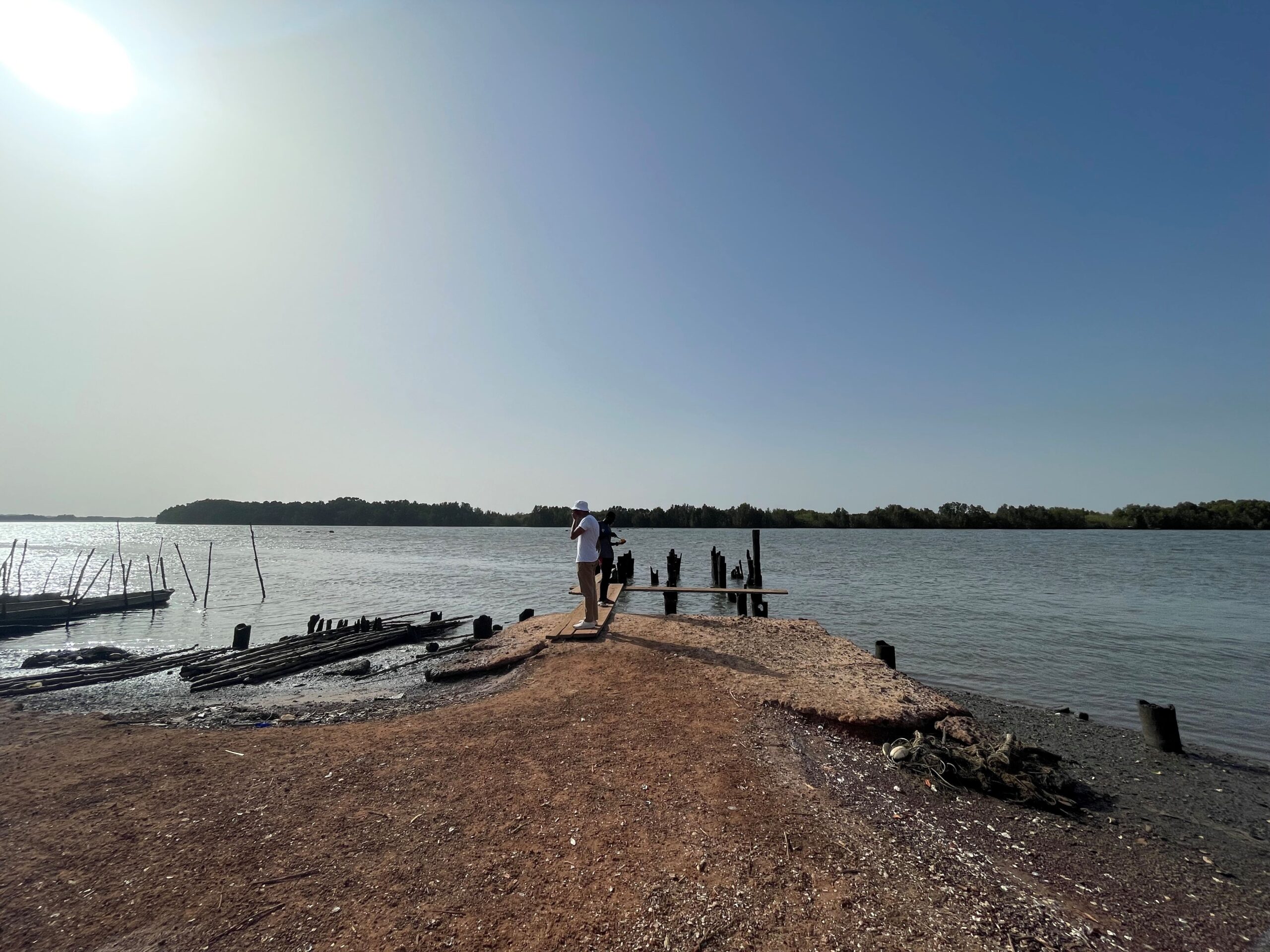
Gambia River lookout.
Power Up Gambia, The Gambia
It’s been a little more than a week already! Honestly, I can’t tell if it went by quickly or slowly, as I’m still trying to get adjusted to living here. I also still can’t believe I’m across the Atlantic, on a totally different continent… like WOW. Now that I’m in Bwiam, a small village in the Foni Kansala district in the middle of The Gambia, here’s what I’ve been up to!
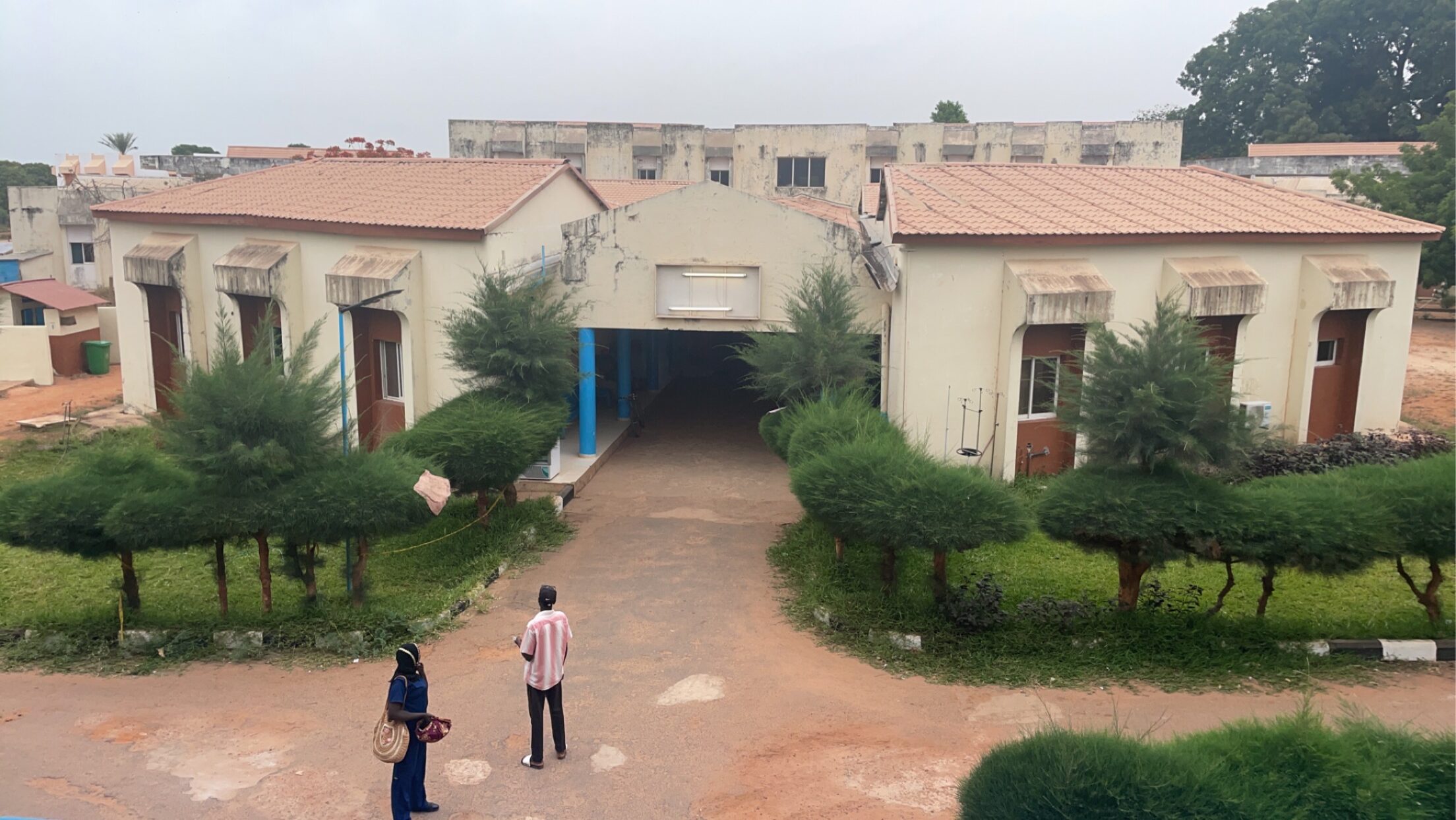 On Wednesday afternoon, we drove from Banjul, the nation’s capital, to Bwiam – a small strip of land along a surprisingly perfectly paved road with zooming cars, with a few stalls selling common market goods, like home necessities or snacks, two restaurants, and a school across from the prominent Bwiam General Hospital. We pulled into the hospital campus, and the bright blue gates opened for us while all the security guards got up and came to our rolled down windows to ask us how we were!
On Wednesday afternoon, we drove from Banjul, the nation’s capital, to Bwiam – a small strip of land along a surprisingly perfectly paved road with zooming cars, with a few stalls selling common market goods, like home necessities or snacks, two restaurants, and a school across from the prominent Bwiam General Hospital. We pulled into the hospital campus, and the bright blue gates opened for us while all the security guards got up and came to our rolled down windows to ask us how we were!
By the way, everyone here is super friendly, and I have the same conversation with each person multiple times a day and everyday:
I say: “Salaam aleikum.” Then they say: “Waleikum, salaam.” “How are you?” “I’m fine, how are you?” “I’m good!”… all this happens as we walk past each other, with big smiles on our faces. In the U.S. people either just stare at you and walk by or keep their eyes on the ground and don’t bother.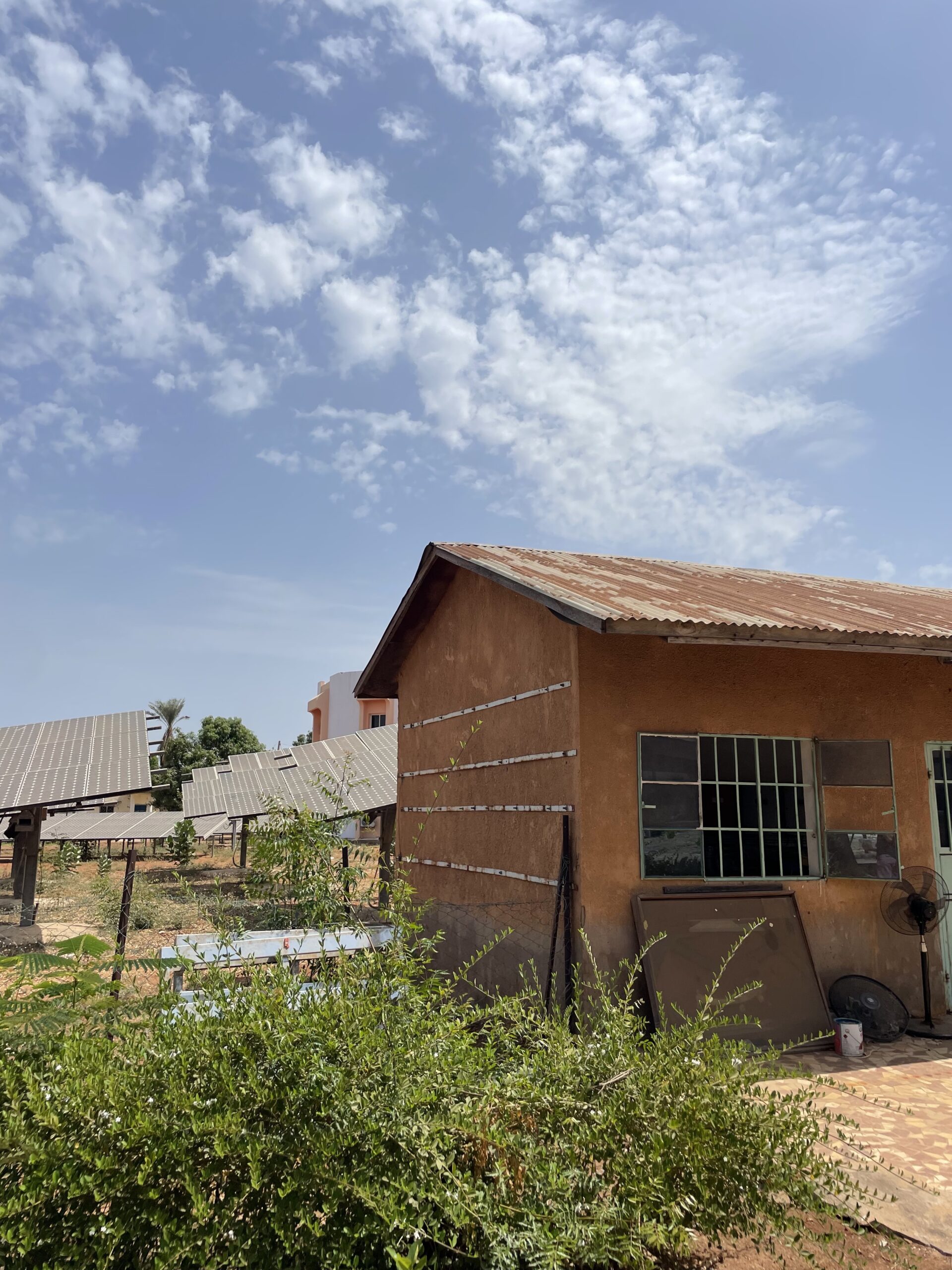
The hospital literally feels like a campus and reminds me a lot of colleges I’ve seen in Anand, India. All the staff, including us volunteers, live in housing units surrounding the main building. However, ours is by far the nicest, with AC units, a freshly painted orange exterior, a living room, and a kitchen. I should add: I’m within 50 feet of the surgery ward as I’m typing this from my bed right now! The CEO (we call him “Chief”) of the hospital, came to greet us and welcomed us, bringing some extra plates and utensils for us and making sure we were all comfortable. Super kind man – thanks to him, we’ll be living in this newly renovated space for the next 2 months.
We had a wonderful lunch cooked by three amazing women, Hawa, Adamma, and Sena, at our friend Saikou’s (an engineer at the hospital) little restaurant. It was fitted with two tables, clay walls painted in orange, and an artistic tiled floor – it even has a tiny TV in the corner, where they watch Bollywood films… my favorite! We went back to unpack, walk around, and just relax before our official first day…
On Thursday, we had a whole orientation of the entire hospital after having a breakfast of tapalapas (similar to baguettes), eggs, and black tea with Chief in his office. It took nearly three hours to greet everyone and sit in their offices to learn about their roles more – we met the deputy CEO, public relations officers, pharmacists, principal nursing officer, surgeon, outpatient department (OPD) physicians, lab techs, gynecologists, maternity ward nurses, sterilizing staff, kitchen staff, laundry staff, members of the tuberculosis clinic, and MORE. I tried making note of everyone’s names in a small book, but I’m still finding myself asking everyone to repeat their names (tip: when in doubt, Ibrahima or Fatou or Mariama are super common names).
Just walking around was eye-opening in terms of the poor infrastructure, setup, and types of equipment (or lack thereof) in each department. There wasn’t even a working washing machine for the women doing all the hospital bed sheets’ laundry! It was crazy, and I totally understand why it’s important for me to see all this before starting to raise funds for all the infrastructure costs.
I learned a lot more though by spending a day in the OPD – their version of the emergency department. In the span of 6 hours, I saw maybe 50 patients – ranging from minor headaches to snake bites to HIV cases (they call this “immunosuppressive,” or simply as a code word “S2” to prevent any patients from getting stigmatized). I learned the country is actually a red zone for HIV. I was also able to directly train under the nurses, learning about procedures I’d 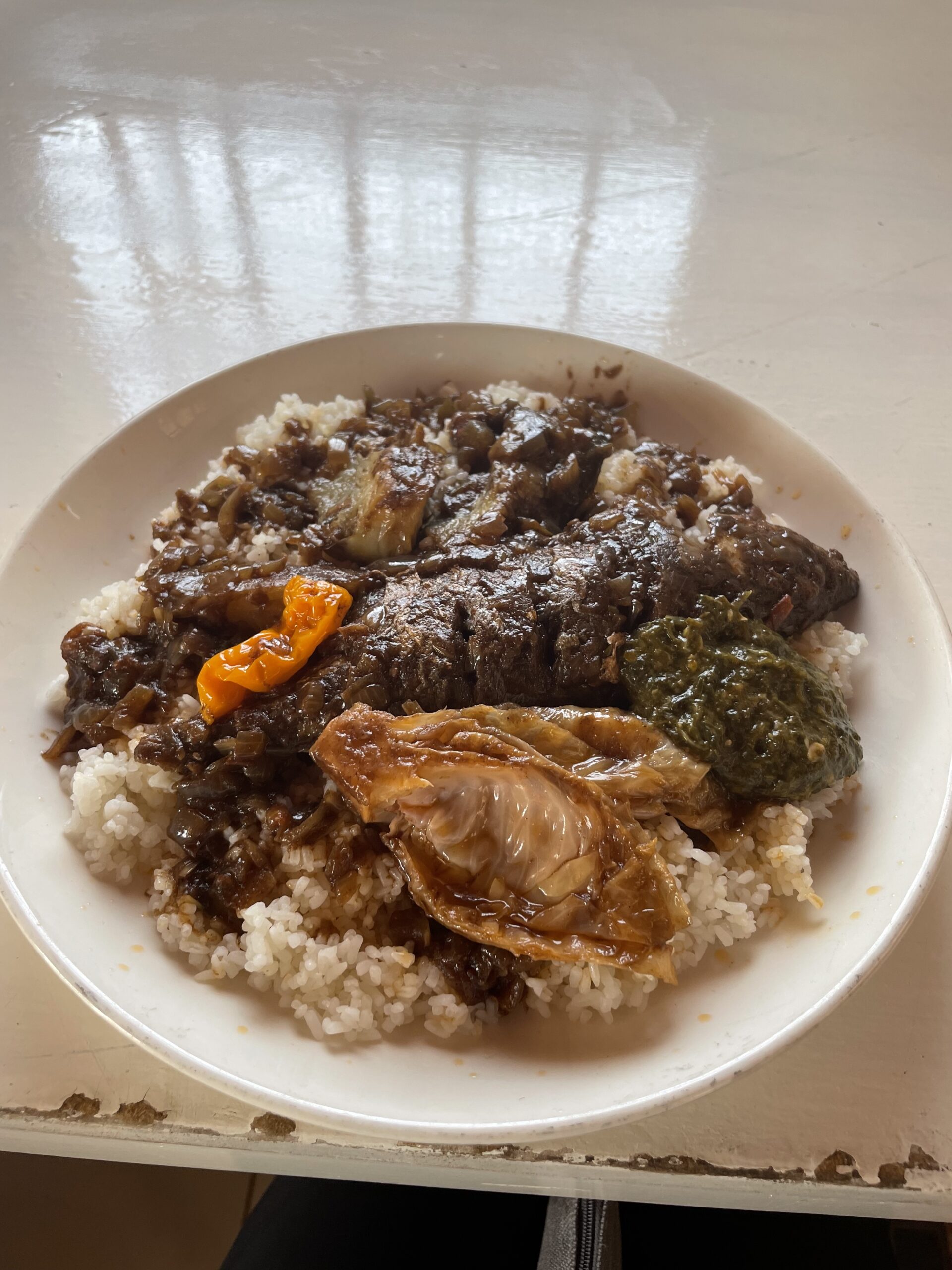 never seen before procedures in lieu of more fancy technology. I’m trying to grapple with the differences slowly as I continue to learn! Speaking of differences, I have met several Cuban doctors, who mostly speak Spanish and little English – another surprise opportunity to practice my conversational Spanish with them. It’s been interesting seeing them trying to help these patients, who mostly speak Wollof or Mandinka or another native language.
never seen before procedures in lieu of more fancy technology. I’m trying to grapple with the differences slowly as I continue to learn! Speaking of differences, I have met several Cuban doctors, who mostly speak Spanish and little English – another surprise opportunity to practice my conversational Spanish with them. It’s been interesting seeing them trying to help these patients, who mostly speak Wollof or Mandinka or another native language.
Besides all the medical activities, I’ve really enjoyed the food and nature here. Lunch is usuall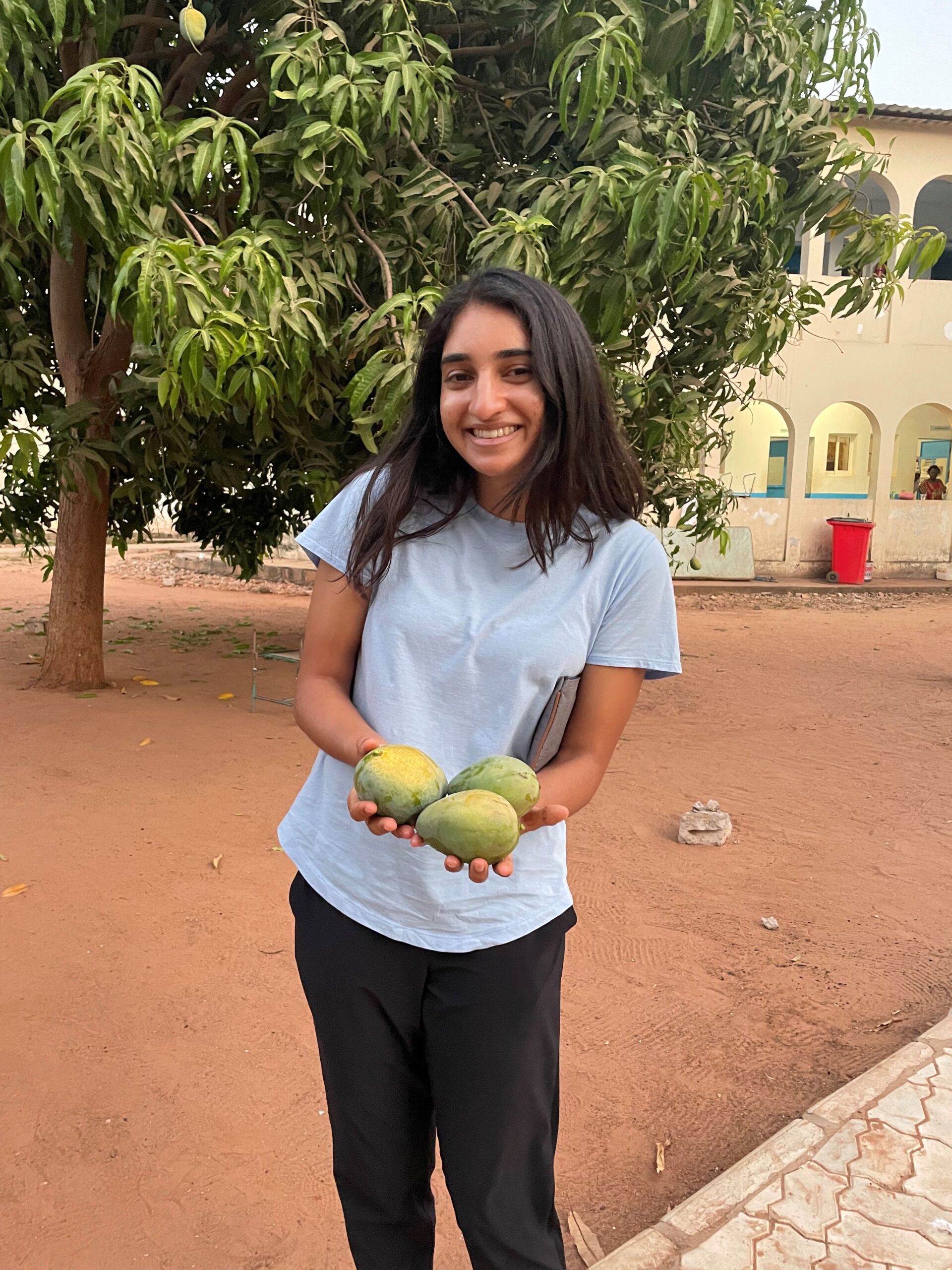 y a heaping plate of white rice with some super flavorful meat curry while dinner (if I’m even hungry for it) is usually some barbecued meat with pasta or noodles. I do miss vegetables though… I’m making it up with all the mango trees here, free for all who can pick them. They’re delicious, perfectly sweet, slightly tender, and refreshing. They line paths of sand on our way to the salt plains and river – we found an amazing lookout to the Gambia River right nearby the hospital, and I try to go every day.
y a heaping plate of white rice with some super flavorful meat curry while dinner (if I’m even hungry for it) is usually some barbecued meat with pasta or noodles. I do miss vegetables though… I’m making it up with all the mango trees here, free for all who can pick them. They’re delicious, perfectly sweet, slightly tender, and refreshing. They line paths of sand on our way to the salt plains and river – we found an amazing lookout to the Gambia River right nearby the hospital, and I try to go every day.
It’s SO peaceful and simplistic and I really appreciate that part. It’s crazy but humbling to think that for fun, we wash & dry our laundry by hand and go for sunset walks in the area before all the insects start taking over our showers. Of course, I’ll feel out of place for now, because my life at home is so different. Excited to see what next week brings, especially with the project I pursue to help out this summer!
The Global Research and Internship Program (GRIP) provides outstanding undergraduate and graduate students the opportunity to intern or conduct research abroad for 8 to 12 weeks over the summer. Participants gain career-enhancing experience and global exposure that is essential in a global workforce.